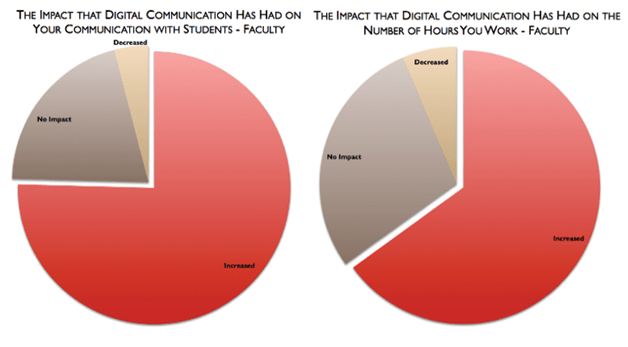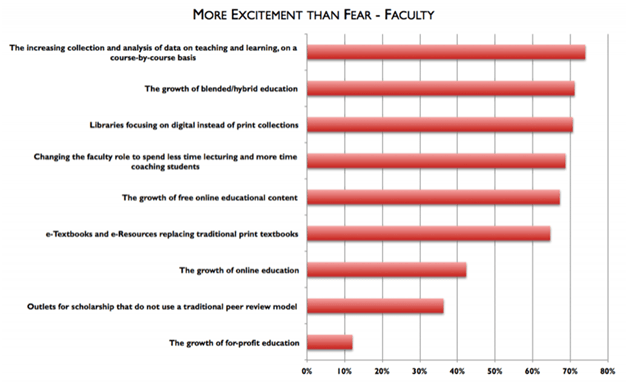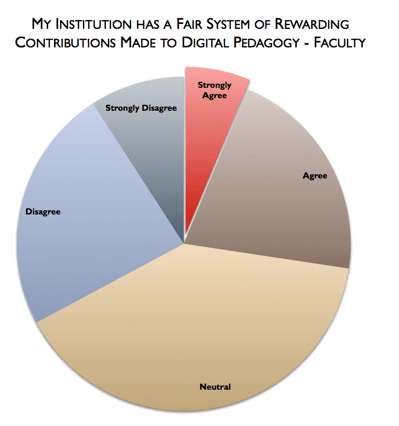A follow-up study was performed to derive an edtech insight on what professors and administrators actually think and feel about digital technology and its growth in education. For the purpose of exploring how college professors and administrators interact
with technology, Inside Higher Ed has partnered with Babson Survey Research Group to conduct a survey. The summary of the survey and interest reflected in ‘Conflicted: Faculty and Online Education, 2012’ , posed several questions pertaining to digital technology education, e-books, social media, communication, learning management software and furthermore diverse issues pertaining to technology. Some of the main points from this excellent report are being discussed here.
Colleges need to reward innovative professors for contributions to digital pedagogy
If colleges look forward to create an improved digital learning experience for their students, they need to incentivize the professors for their extra contribution and efforts.
Though studens love technology, faculty members must constantly come to a decision if the implementation of new material or new digital technology in classroom is worth the investment of their time and effort. They should bear certain things in mind and question themselves if the use of a simulation would advance knowledge and understanding by their students. They should find out whether a new e-textbook would provide the same or superior manifestation of the significant class material. Furthermore, they should seek if the faculty members do give in significant time and effort for the formation and creation of their own classroom materials, whether their effort will be respected and rewarded by their institution.
Based on the survey report, the answer to that last question is an echoing ‘no’. Only 6.3 percent of surveyed faculty members strongly agreed that their university rewarded professor incentives for technology contributions. Nevertheless, the formation of digital technology education and the use of digital technology in classroom offer significant profits to both professors and students, but technology do seem to be responsible for creating new issues at the same time. Due to such reason, implementation of technology in 21st century education will persist at a slow pace if colleges can’t make a strong case for alteration and offer professor incentives for technology innovation.
Digital communication with students is prevalent but stressful
It’s not an amazing fact that professors have become victim to the e-mail contradiction, similar to all other persons. There is no controversy that e-mail is tremendously fitting in our daily lives, and we rely on in it for communication purpose. But, we cannot ignore the fact that it’s also time consuming and stress inducing, especially when we live in an age when our smartphones seem to alert us to new e-mails after-hours.
The chart on the left illustrates the portion that digital communication has increased interaction with students. An increase in communication was reported by 75.4 percent of faculty members, which is no doubt a very affirmative response. The chart on the right shows the impact e-mail has on the number of hours faculty work. Quite remarkably, 65 percent of faculty members said the number of hours they work has increased because of digital communication. Along with this, 41.4 percent of surveyed faculty members also indicated that digital communication was responsible for increasing stress in their lives.

Faculty members are really enthusiastic about the edtech future
There is nothing to worry about as it does not reflect at all a bad scenario. The team at Inside Higher Ed felt that the data was pointing to a superseding dread of what teacers feel about education technology and its growth, but the respondents indicated differently.
The first volume of this report series noted that faculty members felt more dread than enthusiasm about the growth of online education and edtech. A time has therefore, come to consider whether this translates into a general stage of concern among faculty members for all aspects of the technology combination that is taking place in higher education.
The answer is of course ‘no’, because for the major portion, faculty members express additional enthusiasm rather than dread with different aspects of the new technology reality in the future of education. Significantly, more than 60 percent of respondents have expressed that they feel more enthusiasm than dread in edtech future.
The excitement-versus-fear question was enquired about in education technologies to get the teachers view on edtech future. The results are shown below.

Other Key Findings:
- Nearly half of the 4,564 faculty members surveyed, three-quarters of whom are full-time professors, said the rise of online education excites them more than it frightens them.
- Nearly two-thirds of faculty members say they believe that the learning outcomes for an online course are inferior or somewhat inferior to those for a comparable face-to-face course. Even among those with a strong vested interest in online education – faculty members who are currently teaching online courses – considerable concern remains about the quality of the learning outcomes.
- A third of instructors think that their institutions are pushing too much instruction online, compared to fewer than 10 percent of administrators.
- For all the faculty skepticism, the study provides evidence that professors gain more confidence in online learning as they become more involved with it. And on the most basic question asked of faculty at institutions with online offerings – have you recommended an online course to a student or advisee? – 60 percent of faculty reported that they had. The figure grows to 87 percent for those who teach online.
Fluctuations in technology occur at a slower pace in higher education than they take place in business or consumer markets. Nevertheless, things are changing. We would encourage you to go through the report ‘Conflicted: Faculty and Online Education, 2012’ for additional information.
Source: Babson, InsideHigherd, EdTech Magazine


